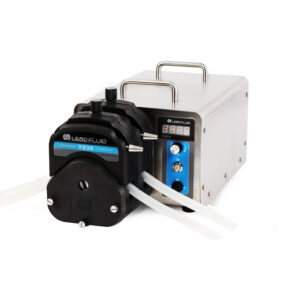Introduction
Industrial peristaltic pumps are highly versatile and reliable tools used in a wide range of applications, including chemical processing, manufacturing, water treatment, and mining. These pumps rely on the compression and relaxation of a flexible tube to transfer fluids without any contact between the fluid and the pump components. The tube material plays a crucial role in the performance, chemical compatibility, and durability of industrial peristaltic pumps. In this article, we explore some common tube materials used in industrial peristaltic pumps, highlighting their properties and applications.
Natural Rubber (NR)
Natural rubber tubes are widely used in industrial peristaltic pumps due to their excellent flexibility, abrasion resistance, and cost-effectiveness. NR tubes offer good resistance to a variety of fluids, including water, mild acids, and alkalis. They are commonly used in applications such as water treatment, dosing of chemicals, and general industrial fluid transfer. However, natural rubber may not be suitable for highly aggressive chemicals or fluids with high temperatures.
Hypalon® (CSM)
Hypalon® is a synthetic rubber known for its exceptional resistance to chemicals, weathering, and ozone. Hypalon® tubes are durable, flexible, and exhibit excellent resistance to a wide range of acids, alkalis, and solvents. They are commonly used in industrial peristaltic pumps for handling corrosive chemicals, such as acids in chemical processing, abrasive slurries in mining, and wastewater treatment.
Viton® (FKM)
Viton® is a fluoroelastomer known for its outstanding chemical resistance, high-temperature performance, and durability. Viton® tubes can withstand aggressive chemicals, solvents, fuels, and oils, making them ideal for demanding industrial applications. They are commonly used in peristaltic pumps for chemical processing, petrochemical industries, and automotive applications. Viton® tubes are also suitable for applications involving high temperatures and harsh environments.
Nitrile (NBR)
Nitrile tubes offer excellent resistance to oils, greases, fuels, and many industrial fluids. They are commonly used in peristaltic pumps for applications involving the transfer of petroleum-based products, lubricants, and hydrocarbon-based chemicals. Nitrile tubes provide good flexibility and abrasion resistance, making them suitable for industrial environments where resistance to oil and fuel is essential.
EPDM (Ethylene Propylene Diene Monomer)
EPDM tubes exhibit excellent resistance to weathering, ozone, and a wide range of chemicals. They are commonly used in industrial peristaltic pumps for applications involving water treatment, dosing of chemicals, and general fluid transfer. EPDM tubes offer good flexibility, electrical insulation properties, and resistance to heat, making them suitable for various industrial environments.
Polyurethane (PU)
Polyurethane tubes offer a balance of flexibility, chemical resistance, and durability. They are commonly used in industrial peristaltic pumps for applications involving abrasive slurries, paints, coatings, and adhesives. Polyurethane tubes exhibit excellent resistance to abrasion, tearing, and impact, making them suitable for rugged industrial environments.
Are there any other tube materials commonly used in industrial peristaltic pumps?
besides the tube materials mentioned in the previous response, there are a few other tube materials commonly used in industrial peristaltic pumps. These materials offer specific properties and are suitable for various applications. Here are a few additional tube materials:
- Polyethylene (PE): Polyethylene tubes are known for their excellent chemical resistance, low cost, and flexibility. They are commonly used in industrial peristaltic pumps for applications such as water treatment, chemical transfer, and fluid dispensing. Polyethylene tubes offer good resistance to acids, alkalis, and some solvents.
- Polypropylene (PP): Polypropylene tubes are lightweight, durable, and resistant to a wide range of chemicals. They are commonly used in industrial peristaltic pumps for handling aggressive chemicals, acids, and corrosive fluids. Polypropylene tubes are suitable for applications in chemical processing, pharmaceuticals, and wastewater treatment.
- Polyvinylidene Fluoride (PVDF): PVDF tubes offer excellent resistance to chemicals, UV radiation, and high temperatures. They are commonly used in industrial peristaltic pumps for applications involving aggressive solvents, acids, and corrosive fluids. PVDF tubes are suitable for industries such as chemical processing, pharmaceuticals, and semiconductor manufacturing.
- Teflon® (PTFE): Teflon® is a brand of polytetrafluoroethylene (PTFE) known for its exceptional chemical resistance, non-stick properties, and high-temperature resistance. PTFE tubes are commonly used in industrial peristaltic pumps for handling highly corrosive chemicals, strong acids, and high-temperature fluids. They are suitable for applications in chemical processing, pharmaceuticals, and laboratory research.
- Polyether Ether Ketone (PEEK): PEEK tubes exhibit excellent chemical resistance, high-temperature stability, and mechanical strength. They are commonly used in industrial peristaltic pumps for handling aggressive solvents, corrosive fluids, and high-temperature applications. PEEK tubes are suitable for industries such as chemical processing, oil and gas, and aerospace.
Specific tube materials
It’s important to note that the availability of specific tube materials may vary depending on the manufacturer and their product offerings. Additionally, the suitability of a particular tube material for a specific application should be verified by consulting the manufacturer’s specifications and chemical compatibility charts.
Conclusion
Choosing the appropriate tube material is crucial when selecting an industrial peristaltic pump for your application. The tube material should be compatible with the fluids being handled, offer sufficient flexibility and durability, and withstand the specific demands of the industrial environment. Natural rubber, Hypalon®, Viton®, Nitrile, EPDM, and Polyurethane are some common tube materials used in industrial peristaltic pumps, each with its own unique set of properties and applications. By considering the chemical compatibility, temperature range, flexibility, and abrasion resistance required for your specific application, you can make an informed choice and ensure optimal performance and longevity of your industrial peristaltic pump.
